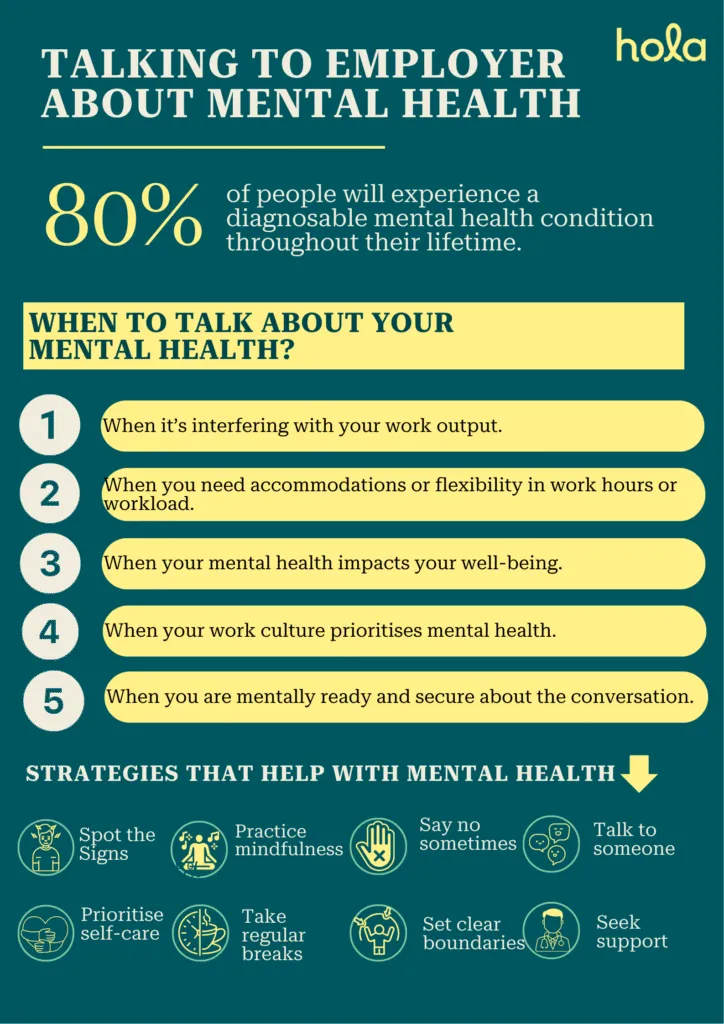How to talk to your employer about your mental health: A guide
Written by editorial staff writer at Hola. Medically reviewed by Amira Shah, MA in Counselling Psychology, Registered Psychotherapist.

Contents

Summary: Discussing your mental health with your employer can feel daunting, but it’s important for your well-being and work performance. By knowing your rights, preparing for the discussion, and focusing on solutions, you can foster a supportive workplace. With honesty and confidence, addressing mental health at work promotes a healthier and productive balance.
Talking about mental health at work can seem like a challenging task—-after all, who wants to share something so personal in a professional setting? But here’s the truth: just as physical health affects your job performance, so does mental health. In fact up to 80% of people will experience a diagnosable mental health condition throughout their lifetime1, whether they recognise it or not. And much like you would inform someone if you broke a bone or caught a cold, it’s important to have open conversations about your mental well-being. While it might feel intimidating at first, talking to your employer about mental health is not only a courageous move but an essential one. It can foster a more supportive and understanding workplace culture for you and your colleagues. So, let’s explore how to approach this sensitive issue with confidence and clarity.
Should you talk or should you not?
Deciding whether to discuss your mental health at work can be a tough decision, and it depends on your circumstances. Here are a few things to think about:When you should talk:
- If your mental health is influencing your performance or well-being at work.
- If you are having difficulty managing your workload or need specific accommodations (like flexible scheduling reduced workload, remote work options or additional support from supervisors).
- If you are in a supportive work environment where mental health is prioritised and your employer is likely to be empathetic.
When you might not need to talk:
- If your mental health is stable and doesn’t interfere with your work.
- If you are uncertain about how your employer will react and prefer to manage things privately for the moment.
- If you are still deciding how to address the situation and need some time to process your feelings.
Ready for positive change? Start your mental health care plan here.
Book an appointment
Fully bulk-billed, across Australia.
When to talk about your mental health?
Determining the right time to talk about your mental health at work can be difficult, but there are key moments when it may be appropriate to speak up. Here are some circumstances to reflect on:- When it’s interfering with your work output: If mental health struggles are affecting your ability to focus, be productive, or meet deadlines, it may be time to have a conversation. Addressing the issue can help you receive the necessary support or adjustments to do your best.
- When you need accommodations or flexibility: if you are facing mental health challenges, such as flexible working hours, a lighter workload, remote work options, mental health days, or more breaks, it’s crucial to talk to your employer to implement the needed changes.
- When your mental health impacts your well-being: If your mental health is severely disrupting your everyday life or causing burnout, stress, or emotional depletion, discussing the situation with your employer can lead to opportunities for help or resources, allowing you to manage your health while staying effective at work.
- When your work culture prioritises mental health: If your workplace promotes a positive and open approach to mental health, with resources, Employee Assistance Programs (EAPs), mental health trainings, and initiatives available to help employees, it’s a good opportunity to have a conversation. A positive culture can facilitate a more comfortable and constructive discussion.
- When you are mentally ready and secure: You should speak up when you feel emotionally prepared and at ease. If you trust your employer and feel assured that the conversation will remain discreet and be received with empathy, it’s the right time to open up.
How do you tell your employer about your mental health?
Having a conversation with your employer about mental health can be challenging, but it’s a crucial step in ensuring you receive the support you need to maintain your well-being. Here’s a step-by-step guide that covers all the factors to consider when preparing for and having that conversation, emphasising clear communication, mutual respect, and seeking solutions:1. Prepare for the conversation:
Before talking to your employer, it’s important to plan to ensure that the conversation is productive and successful.- Identify your needs: Reflect on your current mental health struggles and how they affect your ability to work. Do you need changes in your workload, working hours, or more flexibility to manage your mental health? Be specific about what adjustments or support would help you in handling your responsibilities more effectively at work.
- Research workplace policies: Understand your employer’s policies on mental health and accommodations. Knowing your company’s guidelines can help steer your discussion and ensure you are aware of your rights. Many organisations provide resources such as employee support programs (ESPs) or mental health leave that may prove beneficial.
- Plan your approach: Determine the best way to approach your employer. Reflect on whether it’s better to speak with your manager directly or if it’s more appropriate to go through Human Resources (HR). Consider how to present your concerns professionally and respectfully so that your employer understands the importance of the matter.
- Consider potential solutions: Don’t only focus on the issue; also consider feasible solutions. Would flexible hours, more achievable deadlines, or the option to work remotely help you in balancing your workload and mental health? Propose realistic adjustments that allow you to keep contributing to the organisation while addressing your mental health needs.
- Prepare examples: Provide specific examples of how your mental health has affected your work. Whether it’s struggling to meet deadlines, trouble focusing, or feeling overloaded, concrete examples help your employer comprehend the difficulties you are dealing with. You don’t have to share private details, but illustrating the impact on your work will clarify the situation.
- Seek support: If you are feeling nervous or unsure about how to initiate the conversation, consult a reliable colleague, counsellor, or HR representative beforehand. They can give you advice, help you perfect your approach, or offer emotional assistance as you navigate the conversation.
2. Choose the right time and place:
Selecting the right time and place for the conversation is vital to ensure that it stays private and constructive.- Private meeting: Request for a confidential meeting with your employer to discuss your mental health. This guarantees helps maintain privacy and enables you to speak honestly without distractions.
- Advance notice: Notify your employer in advance that you need to have a private conversation, so they are not taken by surprise. This allows them to reserve time and prepare mentally for the discussion.
- Be flexible: While it's important to have the conversation, be open to scheduling it at a time that is convenient for both of you. Showing flexibility will convey that you value the conversation and wish to approach it with mutual respect
3. Have the conversation:
Once you are prepared, it’s time to discuss the matter with your employer. Here are some tips for handling this delicate subject:- Be clear and concise: While talking about mental health, keep your explanation brief and straightforward. Focus on the essentials and avoid over-elaborating.
- Focus on impact: Explain how your mental health is influencing your performance at work. This helps your employer understand the issue without delving into personal matters. Highlight the impact on specific tasks or efficiency and underline your determination to continue being a valuable team member.
- Suggest solutions: Offer solutions that would allow you to perform better while balancing your mental health. Whether it’s adjusting your hours, extending deadlines, or a temporary change in responsibilities, having suggestions ready shows that you are proactive and committed to finding a practical resolution.
- Be open: While it’s crucial to stand up for yourself, also stay open to input or suggestions from your employer. They might have ideas for support or adjustments that could be helpful. Being receptive helps create a positive and cooperative environment.
- Be receptive: Recognise that your employer may need some time to process what you have shared or may have to discuss options with HR. Be open to their response and seek clarification if required. Remember that finding the best solution may take some time.
- Set boundaries: It’s essential to communicate your personal boundaries, especially regarding what you are comfortable disclosing and how you want to manage your mental health in the workplace. For example, you might express appreciation for their empathy but mention that you prefer not to share detailed information about your condition unless absolutely needed.
- Remember your rights: Know your legal rights related to mental health at work. In many regions, laws protect employees from discrimination and ensure reasonable accommodations. If you are unclear, it may be helpful to speak with HR or a legal expert to better understand your rights. Get an overview of existing and proposed laws at Safe Work Australia1.
- Follow up: After the discussion, send a follow-up email to summarise the discussion and any agreements made. This provides a written reference of your conversation and keeps all parties informed about adjustments.
- Journal if needed: If you feel that the conversation was emotionally intense, writing down your thoughts afterward can assist in processing your emotions. This can be helpful for upcoming conversations, especially if your situations evolve or more adjustments are needed.
What to do when your work is affecting your mental health?
Work-related stress can significantly impact your mental health if not addressed. Identifying early warning signs and taking proactive measures to safeguard your well-being can help restore balance and prevent burnout.- Identify the warning signs: Persistent tiredness, anxiety, irritability, lack of drive, or trouble sleeping can all indicate that your job is adversely affecting your mental health.
- Establish healthy boundaries: Prevent overworking by setting limits on your hours and availability. Learn to say no to new tasks when you're overwhelmed and disconnect from work during your personal time.
- Reach out to someone you trust: Whether it’s a supervisor, HR representative, colleague, or friend, sharing your feelings can provide emotional relief and may lead to helpful solutions.
- Focus on self-care: Engage in restorative activities that are rejuvenating, such as physical exercise, hobbies, or mindfulness practices. Taking regular breaks and ensuring adequate rest are vital for mental resilience.
- Seek professional assistance: If stress becomes unmanageable, a mental health care plan can assist you in developing coping mechanisms, strengthening emotional resilience, and addressing underlying issues.

What are the signs of poor mental health at work?
Recognising signs of poor mental health at work is crucial for early intervention. Common symptoms include ongoing exhaustion, reduced motivation, trouble concentrating, and feeling overwhelmed by routine tasks. You may notice changes in your eating habits or sleeping patterns, increased irritability, or i withdrawal from coworkers. A decline in work performance, missed deadlines, or frequent absenteeism can also indicate emotional distress. Sometimes, physical symptoms like headaches or stomach problems can emerge without a clear origin. It's essential to seek support through your employer’s mental health programs or healthcare if these emotions persist and begin to affect your overall health or daily life. Acting early can significantly influence recovery and productivity.Where to get help
If you are struggling with mental health challenges at work, remember that help is accessible. Start by checking if your workplace provides mental health resources, such as an Employee Assistance Program (EAP), counselling options, or wellness programs. Alternatively, you can reach out to a licensed therapist or psychologist on your own for professional help. Online therapy platforms can offer flexible and confidential services that fit your schedule. Consulting online GP is another excellent starting point, as they can provide referrals or help eliminate any physical reasons for your feelings. Don’t hesitate to rely on trusted friends or family for emotional support. Taking that step to reach out can be a powerful move toward feeling healthier and restoring balance. Telehealth appointment are available quickly, often with minimal wait time. It's a simple and accessible way to take care of your mental well-being. Learn more on bulk billed mental health plan online. Talking to your employer about mental health doesn’t have to be overwhelming—-it’s just another way to ensure you are thriving at work. By being open, proactive and focusing on solutions, you can turn a challenging conversation into a positive move toward achieving a healthier work-life balance. Remember, your health matters, and your employer should be supportive in helping you thrive.Take control of your mental health. Begin your care plan now.
Book an appointment
Fully bulk-billed, across Australia.
Reference
- National Library of Medicine - reference link
- Safe Work Australia - reference link
What we treat
- Cough
- Nausea & vomiting
- Fever
- Hayfever
- Fatigue
- Sore throat
- Acne
- Hair loss
- Gout
- Eczema
- Rosacea
- Sunburn
- UTI
- Erectile dysfunction
- Contraception
- Morning sickness
- Morning after pill
- Prostate health
- Anxiety
- Depression
- Stress
- Grief & loss
- Antidepressants
- Premature ejaculation
- Asthma
- Blood pressure
- Blood thinners
- Diabetes
- Cholesterol
- Migraines & headaches
- Allergies
- Body ache
- Heartburn & reflux
- Sleep disorder
- Pain relief
- Gastro
Related Articles
What Is Online Therapy? Everything You Need To Know About e-Therapy
February 19, 2026Mental Health
...
Disclaimer
This blog is for general informational purposes only and does not indicate that Hola Health provides all treatments or preventive measures mentioned. It is not intended to be a substitute for professional medical advice. Always seek the guidance of your doctor or other qualified health professional with any questions you may have regarding your health or a medical condition. For emergencies please immediately contact 000. Any medical topics discussed are intended to educate, not to imply availability through Hola Health.
 Facebook
Facebook  X
X  Copy Link
Copy Link



